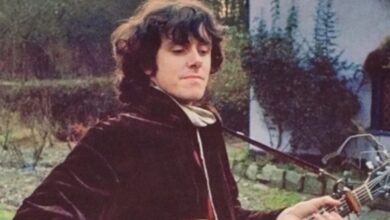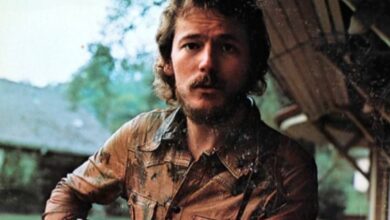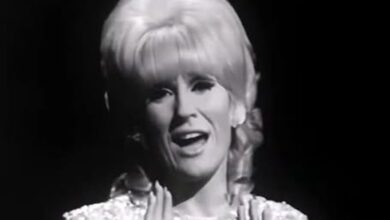Aerosmith and YUNGBLUD Set the Rock Scene Ablaze with Their Electrifying New Duet “A Thousand Days”
The collaboration between Aerosmith and YUNGBLUD on “A Thousand Days” unfolds like a moment where two distant generations discover they’ve been speaking the same emotional language all along. Aerosmith bring the weight of decades—songs built from turbulence, triumph, and heartbreak—while YUNGBLUD arrives with a restless modern edge, full of urgency and unfiltered honesty. When these two worlds finally collided, the result never felt like a marketing stunt. It felt like the kind of overdue artistic dialogue that somehow waited years to happen.
The timing behind their union adds an unexpected depth to the story. After Steven Tyler’s vocal injury and the emotional curtain call of their 2024 farewell, fans had quietly accepted that Aerosmith’s creative chapter might be closing. But out of that silence, YUNGBLUD emerged—not as a wide-eyed fan, but as an artist bringing a new kind of spark. Their earliest conversations reportedly weren’t even musical, yet something in their chemistry grew into an idea neither side predicted, eventually crystallizing into a collaboration with real gravity.
As they continued working together, listeners began noticing how naturally their energies intertwined. Earlier in 2025, glimpses of their connection appeared during small tribute performances, revealing an emotional compatibility that didn’t require explanation. Tyler has always performed like a storm—wild, expressive, and impossible to contain—while YUNGBLUD’s style radiates like a fuse burning fast. Together, they created a blend that felt both familiar and strange, like two different weather systems colliding over the same horizon.
The track “A Thousand Days” doesn’t follow a typical rock blueprint. Instead, it starts in a hushed, vulnerable space, like a confession spoken in low light. The arrangement expands gradually, building emotion instead of volume, with soft chords swelling underneath subtle guitar details. The structure reflects the sensation of counting days, replaying memories, and trying to heal while still clinging to what hurts. It feels less like a composition and more like a slow emotional unraveling.
YUNGBLUD opens the song with that trembling, exposed delivery he’s known for—raw enough to feel like reading a private letter aloud. When Tyler enters, the tone shifts without overpowering what came before. His voice carries the weight of decades, each note shaped by lived experience rather than technique. Instead of overwhelming YUNGBLUD, he becomes a second voice in the same emotional confession, their tones blending like two shadows converging beneath the same light source.
The lyrics explore a heartbreak that refuses to fade. “A Thousand Days” becomes a metaphor for endurance—how pain lingers long after the world expects acceptance. The writing merges YUNGBLUD’s direct vulnerability with Aerosmith’s dramatic emotional sweep, producing a story that feels grounded yet cinematic. It’s one of the rare duets where both singers sound wounded, both reaching for understanding rather than dominance, making the emotional weight feel shared instead of staged.
The chorus marks the moment where the song unmistakably channels Aerosmith’s emotional DNA. Tyler’s soaring, textured vocals rise like a desperate prayer, but YUNGBLUD’s grounding presence keeps the track modern and intimate rather than nostalgic. Together, they create a dramatic surge that neither could produce alone—a fusion of youthful urgency and veteran intensity that makes the emotional peak hit with extraordinary force.
Within the EP’s flow, “A Thousand Days” stands as the emotional axis. While other tracks lean into energy and fire, this one pauses the momentum to deliver something raw and deeply personal. Critics have already pointed to it as the defining moment of the project—not because it’s loud, but because it’s sincere. It doesn’t attempt to recreate old Aerosmith anthems or mold itself to YUNGBLUD’s usual direction. Instead, it creates a new middle ground where both artists feel fully present.
Its absence from any live performance only adds to its growing mystique. Fans imagine what it might look like onstage: dim lights, a hushed crowd, YUNGBLUD opening with trembling gentleness before Tyler steps through the shadows toward the mic. People discuss it online like a scene from a concert film that hasn’t happened yet—everyone waiting to see whether the two will ever breathe life into the song in real time.
If a live rendition ever appears, the atmosphere is easy to picture. The band would likely begin with quiet restraint, letting the room settle before the first lyric breaks the silence. YUNGBLUD would ignite the emotional tone, opening the door, and Tyler would burst through with the force of years behind him. That final chorus would crash over the audience like a wave, with phones shaking as fans try to capture the moment through tears, adrenaline, or both.
For Tyler, “A Thousand Days” represents more than a guest appearance. After facing vocal challenges and stepping back from nonstop touring, the song proves that his artistry has transformed rather than diminished. He leans into the flaws and cracks of his voice, turning them into emotional textures only a lifetime of experience can create. Instead of trying to sound like the past, he embraces the truth of the present—and that honesty becomes one of the track’s greatest strengths.
YUNGBLUD, on the other hand, steps into a defining artistic moment. Collaborating with a band as legendary as Aerosmith is more than a milestone—it’s a signal that his emotional intensity and sonic identity have matured into something worthy of cross-generational resonance. You can hear him shape his vocal phrasing around Tyler’s presence, not imitating but harmonizing, proving he can stand confidently beside one of rock’s most iconic voices.
The fan response has been overwhelmingly passionate. Older listeners appreciate the return to emotional, narrative-driven rock, while younger audiences see this as YUNGBLUD’s most vulnerable vocal moment to date. Comment sections have turned into conversations between generations—some sharing memories of Aerosmith’s earlier ballads, others discovering those songs for the first time through this collaboration. The track reminds everyone that emotional truth doesn’t age; it only deepens.
In a broader cultural context, “A Thousand Days” arrives during a period when rock music is often dismissed as fading or irrelevant. Yet here stand two artists from opposite ends of the timeline proving the opposite—not by reinventing the genre, but by returning to its essence. Rock lives strongest in moments of vulnerability and honesty, and this track taps directly into those roots. It doesn’t modernize rock by force; it modernizes it by sincerity.
Ultimately, “A Thousand Days” feels like a meaningful new chapter for both artists—an unexpected turning point for Aerosmith and a deeply emotional milestone for YUNGBLUD. It isn’t a comeback or a reinvention; it’s a shared moment of truth captured in one song. Whether they ever perform it live or let it remain a studio-born treasure, its significance is already carved into their artistic stories.
That may be why the track resonates so powerfully. It doesn’t claim to solve heartbreak or romanticize suffering. Instead, it captures two artists meeting in the same emotional space, shaping their pain into something quietly beautiful. “A Thousand Days” becomes more than a duet—it becomes a confession, a bridge between generations, and a reminder that rock music still knows how to wound, comfort, and connect all at once.





